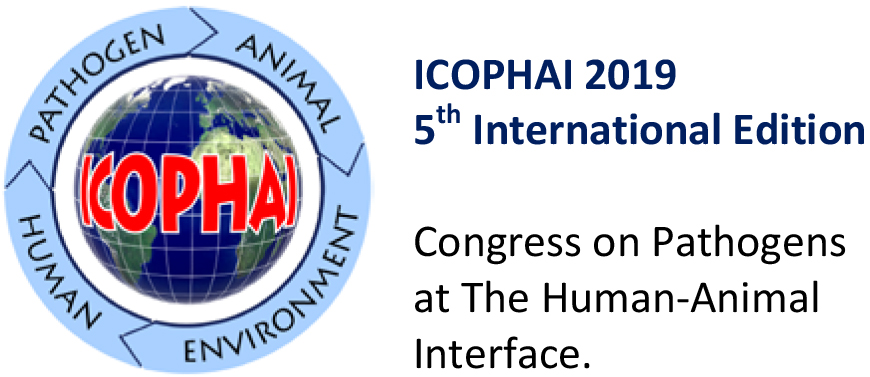Dear Colleagues, Fellow participants of the Second International Congress on Pathogens at the Human Animal Interface (ICOPHAI):
On behalf of the Organizing team, composed of scientists and policy-makers from the host nation, Brazil and global partners including the United State, Africa, Asia and Europe, we welcome you all to this exciting time. As we mark the second congress in the tropical city of Porto de Galinhas, Brazil, it is more than ever clear that zoonotic diseases impose huge burden to mankind globally and with a much higher burden on tropical regions particularly such as sub-Saharan Africa, Asia and Latin America.
Among the most recent outbreaks, we would like to remind all the recent outbreak of a new high pathogenic avian influenza, H7NA in China.
The International Livestock Research Institute (ILRI), one of our founding partners of the Veterinary Public Health and Biotechnology (VPH-Biotech) consortium, released a report in 2012 mapping the top 20 geographical hotspots of emerging zoonotic diseases. Collectively, these diseases impose heavy burden on one billion of the world’s poor, particularly the pastoralist and small-holder livestock holders. The burden of zoonoses does not stop in the poor and under-developed regions. Their impact is expanded to the industrialized world as well. As we speak, Cyclospora cayetensis is causing a huge outbreak in the United States. According to the U.S. Center for Disease Control and Prevention, as of end of July,Cycloporiasis has been reported in 395 cases in 17 U.S. states. The interface between animals, humans and the ecosystem is the major fueling factor for emergence and reemergence of such outbreaks. Such examples of outbreaks are stark reminders of the constant need of scientists and policy-makers to work together collaboratively to prevent and control of zoonotic diseases and build the knowledge equity and capacity of developing regions to be able to tackle them effectively and establish sustainable infrastructure. The International Congress on Pathogens at the Human Animal Interface (ICOPHAI), established by a consortium of institutes across the globe aims to utilize the ONE HEALTH approach to operationalize One Health, build capacity and tackle zoonotic, foodborne and vector-borne infections. As we prepare to launch this congress, the organizing team is pleasantly surprised by the regular flow of interested and committed scientist who showed ommitment to take part at this congress. We received more than 760 registrants in our online system that originated from more than 50 countries and close to 200 research, academic, regulatory and intergovernmental institutes world-wide. A total of 301 abstracts were submitted.
The organizing body was also humbled by the clear and consistent commitment of sponsoring agencies, who stepped up to the plate to support this congress finacially.
We are grateful to the support of all sponsors, which are listed on the back of this congress program document. These committed sponsors, not only enabled us to organize the congress and pay for the venue and organization expenses, In addition, they enabled the organizing team to support travel, accommodation and meal expenses to more than 100 participants with full or partial expenses covered. The sponsored participants were primarily from developing regions. We would also like to thank the commitment of the organizing partners particularly the academic institutes in Brazil and the U.S. Finally, we are very much grateful to our keynote and plenary speakers and other dignitaries who have a proven leadership in their respective scientific disciplines, who are here to share their knowledge, strengthen scientific networking and help us all together achieve our goals in the short or long-term. We are particularly grateful to them because most of the invited speakers, besides their mind, also shared their pocket- many volunteered to pay registration fees so that we can use the funds to support need participants; paid their way for their flights and also some even covered all their expenses. So, we thank our plenary and keynote speakers very much. Finally, to all ICOPHAI 2013 patrons, colleagues and scientists, we would like to ask and encourage you all to take the three days congress period as an opportunity to: 1) promote the science you are doing; 2) to engage in scientific networking; 3) maximize the scientific inputs you receive from all and further; 4) apreciatte the value and need for unconventional partnership across diverse disciplines and sectors to achieve the complex issues of outbreaks caused by pathogens at the human, and need for unconventional partnership across diverse disciplines and sectors to achieve to complex issues of outbreaks caused by pathogens at the human, animal and ecosystem interface and 5) upon your return to your home, we ask you to actively seek to operationalize One Health in your capacities, be it in small district in sub-Saharan Africa (Borana or Masai Mara) or the caatinga region of North–eastern Brazil or at headquarters of intergovernmental agencies such as Food and Agriculture Organization (FAO), United Nations University (UNU) or the International Centre for Genetic Engineering and Biotechnology (ICGEB).
Again, on behalf of all the organizing body of ICOPHAI 2013, including the International Organizing Team, the local Organizing Team, the Scientific Program Committee and the ICOPHAI Advisory Body, welcome to ICOPHAI and we wish you the best time in Porto de Galinhas, Brazil.

